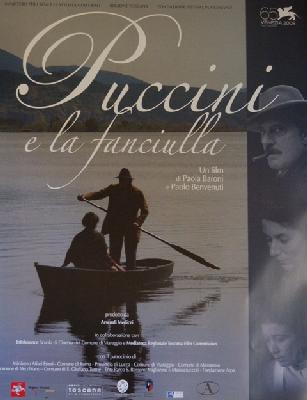
PUCCINI E LA FANCIULLA
Italy, 2008, 84 minutes, Colour.
Puccini e la Fanciulla is a short episode in the life of composer Giacomo Puccini. In 1908-1909, he was composing The Girl of the Golden West. The music from this opera features throughout the film, played by Puccini, illustrating his composition.
The film tells the story of a young servant, Doria, who is used as an intermediary by Puccini for his mistress. However, she comes under suspicion from Puccini’s jealous wife and his permissive daughter. They misunderstand the situation, create blame for Doria, have her hidden away. When she is allowed out, she tries to go to communion but the parish priest refuses. He has previously condemned her. Finally, she takes poison and over a period of five days finally dies. An examination of her by the doctor after her death finds that there was no guilt.
What is of interest is that the film is very much like a film of 1908-09. It uses the method of silent films. However, letters from various characters are read aloud. There are some whispers from characters. However, the acting is of the silent film style, the characters having to communicate by gestures and body language. This is done very effectively. The film is beautiful to look at, especially the villa and the lake. With its musical score, it actually resembles almost an antique from the beginning of the 20th century.
The film is an interesting anecdote, the background for Puccini, life in Italy at the beginning of the 20th century, morals and ethics of the period.
1.Interest in Puccini, his music, his life, background?
2.1908-9, the Puccini villa, the lake, the woods, the beauty, the countryside, the hotels? Paris?
3.The musical score, The Girl of the Golden West? Other classical music? Puccini at work, composition, performance?
4.The style of the film, silent, the reading aloud of letters, the camerawork, movement, fixed camera, high and low angles? The acting style without speaking? The effect of watching a film made in 1908-9?
5.The information about Doria, the drama to illustrate her life, her death, the reasons?
6.The focus on Doria, her opening the rooms, greeting the guests, her work for the family, her place in the family, her age, innocence? Carrying the notes for Puccini? Her relationship with Elvira? Seeing Fosca and her being with her lover? Elvira watching her, assuming that Doria was guilty? The Christmas gift? Her going back, Rodolfo and his anger, violence? Giulia and her care for her? Her being locked in the room? The notes through Giulia? To Puccini, talking about what had happened, about Elvira beating her and humiliating her? The priest and his condemnation? The final letter, her wanting to go to communion, refused, taking poison, found to be pure? Fosca and her resentment, the information about Fosca and her scandals, the mother and her past scandals, Doria as scapegoat?
7.Puccini in himself, his reputation, his wife of twenty years, the past scandal, his own liaisons, with Sybil in Paris, her singing his music? With Giulia? His place in the family, his reconciling with his wife? Rodolfo and his violence, getting him the job in Genoa? Emilio driving him? Going to Paris, the letters to Sybil? His letters from Doria, the end? The type of living, the era?
8.Fosca, her relationship with mother and father, her lover, her children? Petulant with Doria? The letter and the scandals? Her husband’s threats?
9.The mother, the mistress of the house, her anger at her husband, anger at Doria, following her? Reconciliation with Puccini? Her becoming more paranoid? The threat of the scandals?
10.Sybil, the opera singer, mistress, with Puccini in Paris?
11.The servants, Emilio driving the car, Rodolfo and his attack, getting the job in Genoa? The family’s gratitude to Puccini? Giulia and her singing?
12.The Catholic church, the priest, his condemnation, refusing Doria communion?
13.The owner in Genoa, the background photo, the development of the 20th century?
14.A 19th century story – as the 20th century began?